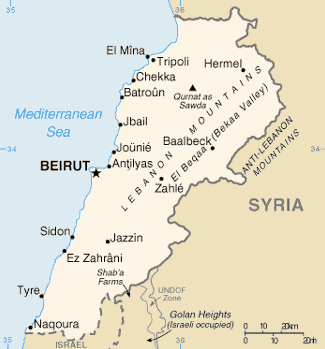A New President for Lebanon: Critical Crossroads

By: Ghassan Rubeiz / Arab America Contributing Writer
Lebanon stands at a pivotal moment. Its parliament convenes for possible presidential elections on January 9, following a destabilizing two-year vacancy. The timing appears suitable, as exhausted political factions face tremendous pressure to act, and power dynamics have changed. Israel’s presence in South Lebanon, Hezbollah’s diminished influence following October 7, and the Assad regime’s collapse in Syria have all fundamentally altered Lebanon’s political landscape.
While Lebanon desperately needs a president, the real challenge lies in reforming its entire system of governance. The current sectarian power-sharing arrangement, mandating a Maronite Catholic president, Sunni Muslim prime minister, and Shiite Muslim parliament speaker, persists despite Lebanon’s increasingly secular and socially integrated society. This resistance to political evolution, reinforced by entrenched religious authorities, has fueled a massive exodus, with the Lebanese diaspora now exceeding the country’s domestic population. Within its borders, the numbers of foreign residents and refugees nearly match those of native citizens, raising questions about Lebanon’s viability as a nation-state.
Lebanon’s need for effective leadership has never been more dire. Lebanon faces a perfect storm of systemic corruption, economic collapse, warlord rivalries, and persistent conflict between Hezbollah and Israel. Recent developments have shifted both domestic and regional power dynamics, with many observers anticipating increased influence from the United States and Arab Gulf States, though history suggests Washington’s local partnerships have often failed to resonate with popular local and regional sentiment.
The outcome of the January 9 election remains uncertain. Its failure would reflect and compound multiple crises: the entrenchment of civil war politics, the potential withdrawal of Hezbollah politicians from the new government, Israel’s continued southern occupation, and American distraction with broader regional challenges in Syria, Gaza, and Ukraine.
Two leading candidates exemplify Lebanon’s complex political calculus. General Joseph Aoun, the armed forces chief, leads the field despite concerns about his close ties to Washington and Saudi Arabia. Jihad Azoor, a senior International Monetary Fund official, faces some resistance from Hezbollah, which views him as overly Western-oriented and insufficiently supportive of armed resistance. While Lebanon has rarely seen transformative leadership, the next president must navigate between authority and compromise.
Informal discussions with Lebanese citizens and Lebanese Americans reveal a pervasive skepticism about meaningful change. Some await President-elect Trump’s inauguration for potential shifts, while others see a reasonable chance of electing a consensus president, likely Joseph Aoun, either on January 9 or before the ceasefire with Israel expires by January 27.
Despite modest expectations, a successful election could catalyze immediate improvements: replacing the interim cabinet, forming a new government, preparing for parliamentary elections, enhancing public services, reactivating courts, reforming the banking system, and reviving tourism. Any of these developments could cause regional ripple effects, particularly in Syria, facilitating the return of refugees and potentially integrating Hezbollah’s military wing into the Lebanese army – a crucial step toward better international relations.
While radical reform of Lebanon’s sectarian political system remains improbable under its current patriarchal and tribal leadership, the situation cannot deteriorate further. These elections represent a crucial step toward stability, even if transformative change remains distant.
*Note: This analysis was written the weekend before the January 9 elections, and Lebanon is known for its political surprises.*
Ghassan Rubeiz is the former Middle East Secretary of the World Council of Churches. Earlier, he taught psychology and social work in his country of birth, Lebanon, and later in the United States, where he currently lives. For the past twenty years, he has contributed to political commentary and delivered occasional public talks on subjects related to peace, justice, and interfaith. You can reach him at rubeizg@gmail.com
The views and opinions expressed in this article are those of the author and do not necessarily reflect the position of Arab America. The reproduction of this article is permissible with proper credit to Arab America and the author.
Check out our Blog here!









